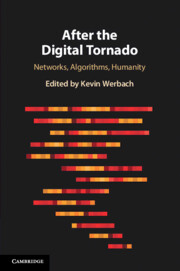After the Digital Tornado
Networks powered by algorithms are pervasive. Major contemporary technology trends – Internet of Things, Big Data, Digital Platform Power, Blockchain, and the Algorithmic Society – are manifestations of this phenomenon. The Internet, which once seemed an unambiguous benefit to society, is now the basis for invasions of privacy, massive concentrations of power, and wide-scale manipulation. The algorithmic networked world poses deep questions about power, freedom, fairness, and human agency. The influential 1997 Federal Communications Commission whitepaper Digital Tornado hailed the “endless spiral of connectivity” that would transform society, and today, little remains untouched by digital connectivity. Yet fundamental questions remain unresolved, and even more serious challenges have emerged. This important collection, which offers a reckoning and a foretelling, features leading technology scholars who explain the legal, business, ethical, technical, and public policy challenges of building pervasive networks and algorithms for the benefit of humanity. This title is also available as Open Access on Cambridge Core.
Kevin Werbach is Professor of Legal Studies and Business Ethics at the Wharton School, University of Pennsylvania. A world-renowned expert on emerging technology, he examines business and policy implications of developments such as broadband, big data, gamification, and blockchain. Previously, Werbach served on the Obama Administration’s Presidential Transition Team, founded the Supernova Group (a technology conference and consulting firm), led Internet policy at the Federal Communications Commission, and created a massive open online course. His books include For the Win: How Game Thinking Can Revolutionize Your Business and The Blockchain and the New Architecture of Trust.



